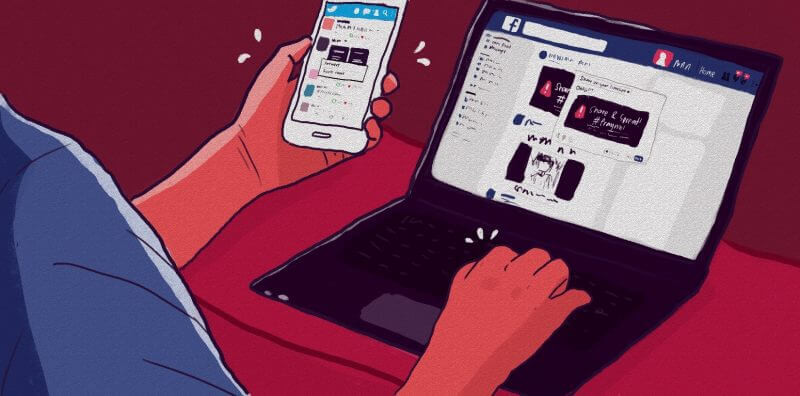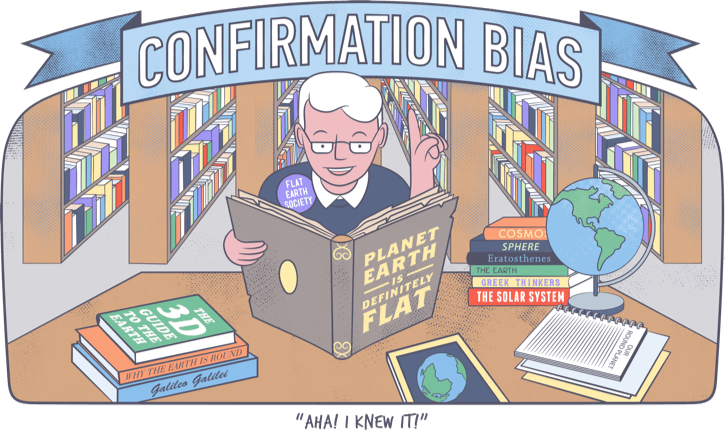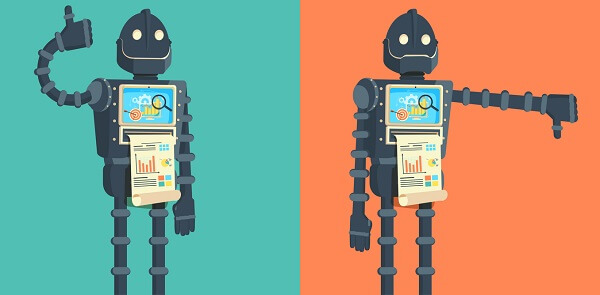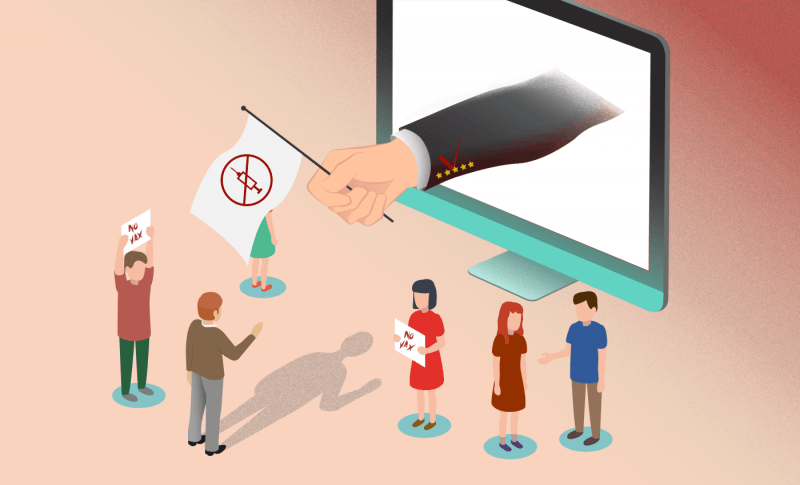The (Mis)information Age
Conspiracy on the Rise

The internet era has led to an explosion of knowledge and information that is easily accessible to the public.
IBM estimates that nearly 90% of all of the world’s data has been created within the past two years. However, the growing amount of consumable online information may not be a good thing. The internet is filled with algorithms that work to keep users engaged by feeding them information that's specifically tailored to their interests, values, and beliefs. This creates informational funnels that distort our judgment as a result.
Our Cognitive Bias

According to professors from the University of Chicago, conspiracy theories have been a staple of American culture way before the information age, and there is a psychological explanation for this.
An individual’s susceptibility to endorsing conspiracy theories comes from two primary factors:
- a human tendency to attribute unexplained or extraordinary events to unseen forces
- a natural tendency towards sensationalized narratives that explain history in the context of good vs. evil.
Human psychology points to our unconscious inclination to find correlations in coincidental events and attribute the cause to a harmful stimulus. This explains why when we hear a creak in the night, we automatically fear it is a sign of an intruder, even though over 80% of break-ins occur during the daytime.
Human beings naturally have a confirmation bias where we readily believe information that confirms our preexisting beliefs, whereas, in order to believe an opposing fact, we require much more evidence before we can be swayed. Confirmation bias is highly useful for humans, it has enabled us to survive for many centuries by gravitating to elements that are familiar to us: whether it be words, sounds, or shapes. Familiarity often meant safety in the context of evolution. Proximity is an important factor of attraction, which means that the more we are exposed to something, the more we like it.
Psychologically, human beings enjoy Manichean narratives which present the world through a binary framework, where everything can be categorized as either good or evil. These kinds of narratives reduce a complex reality into a simple explanation for why things are the way they are.
Technological Bias

In the information age, a confirmation bias impedes our ability to recognize and process information that opposes our preexisting beliefs - and in the age of fake news, this is very dangerous indeed. This psychological phenomena which kept us safe for many centuries now pose a barrier to our ability to critically engage with content.
Research has pointed to Youtube as being a driving force behind the rising number of people who believe in the flat earth conspiracy theory. Youtube's algorithm has been the focus of public criticism and debate since 2016 after it was found responsible for the conspiracy crisis among other things.
The goal of youtube's algorithm, first and foremost, is to encourage users to continue spending time on the website in order to increase value and, in turn, profit. Research has concluded that Youtube's algorithm systematically favors videos that are polarizing, sensational, and conspiratorial because those videos are more likely to spark an intense reaction from users, and in turn encourage them to continue engaging with the platform.
A study by Texas Tech University interviewed attendees of the Flat Earth Conference in Colorado this past year and cited Youtube videos when asked what lead them to their beliefs. In fact, many stated they were watching videos on other conspiracy theories when the Youtube algorithm suggested flat earth videos for them to watch next.
These interviews led researchers Ashley Landrum to point out the flaws in Youtube's algorithm which can often lead users down a rabbit hole of misinformation, and with few videos to counteract this, users can become susceptible to popularized yet false conspiracy theories.
Social Bias

The social comparison theory, which emerged in 1954, states that human beings regularly evaluate their own attitudes and beliefs in comparison to peers. This helps us establish a reference point on which to judge our own ideas, we are more likely to believe something if we see others do.
The rise of fake news has left many questioning the reliability of mainstream sources. Authorities hold much less social power in the post-truth era, and social media amplifies the voice of conspiracy theorists by providing a platform that can reach millions of others.
The traditional gatekeepers of knowledge: journalists, scientists, government officials, and experts have dissolved in the internet age. Whereas prior to the internet these gatekeepers were the primary disseminators of knowledge, the internet has enabled anyone with access to a keyboard to have the same influence without any of the qualifications or consequences for spreading misinformation.
Social media platforms also create the perfect conditions for an echo chamber to manifest, which refers to an informational bubble where people increasingly become exposed to information that confirms their preexisting beliefs rather than challenges them. Echo chambers are often found on the social media platforms, where algorithms work to feed users content that align with their beliefs and interests, and consequently, begin to omit any content that opposes them.
Those who believe in conspiracy theories are much more likely to share their beliefs with others who share their view rather than those who will oppose them. The internet facilitates polarized online communities for conspiracy believers, this enables users to share their beliefs within a group where opposing views are rarely found. This type of closed communication enables the proliferation of echo chambers, where beliefs are strengthened, resulting in a wide separation between believers and non-believers.
The results? Extreme polarization between two sides of a debate.
Cause for Concern

To measure the damage of misinformation being spread on the internet, we don't have to look any further than the anti-vaccine movement that has gained popularity in the past couple of years. Although measles was declared eradicated from the U.S. in 2000, there have been over 700 confirmed cases as of April 26th, 2019. Over 500 of those cases were found in patients who had not received vaccinations. The World Health Organization announced on April 15, 2019, that measles cases in the first quarter of 2019 have increased by 300% since 2018.
Despite the ever-increasing access to knowledge that the information age has brought, the presence of social media has facilitated the spread of misinformation at frightening speeds. To remain informed, we must remember the various biases that distort our understanding of the truth.